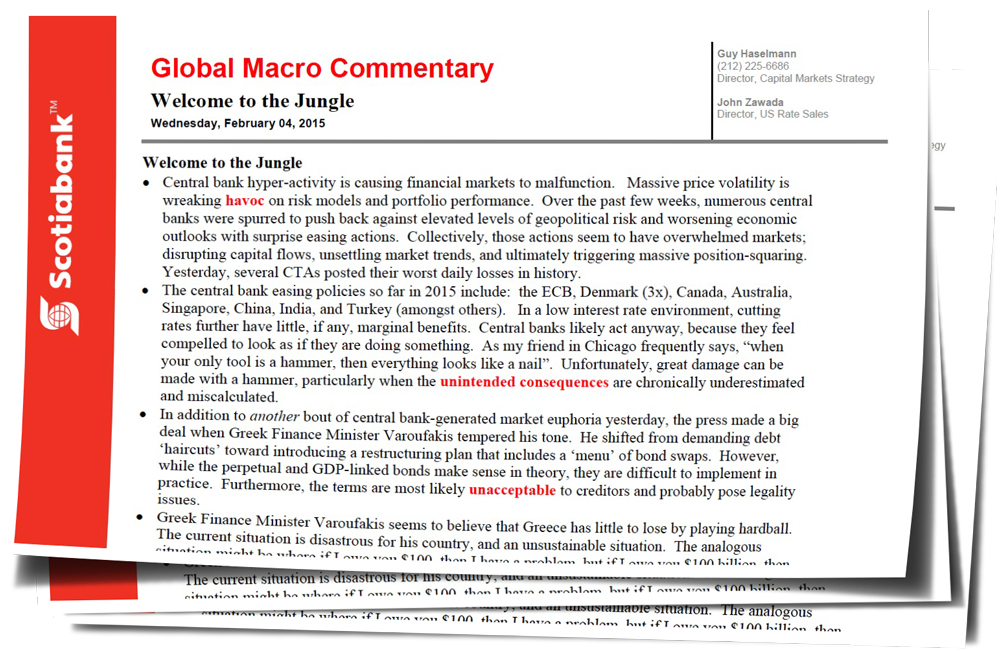Welcome to the Jungle
by Guy Haselmann, Director, Capital Markets Strategy, Scotiabank GBM
· Central bank hyper-activity is causing financial markets to malfunction. Massive price volatility is wreaking havoc on risk models and portfolio performance. Over the past few weeks, numerous central banks were spurred to push back against elevated levels of geopolitical risk and worsening economic outlooks with surprise easing actions. Collectively, those actions seem to have overwhelmed markets; disrupting capital flows, unsettling market trends, and ultimately triggering massive position-squaring. Yesterday, several CTAs posted their worst daily losses in history.
· The central bank easing policies so far in 2015 include: the ECB, Denmark (3x), Canada, Australia, Singapore, China, India, and Turkey (amongst others). In a low interest rate environment, cutting rates further have little, if any, marginal benefits. Central banks likely act anyway, because they feel compelled to look as if they are doing something. As my friend in Chicago frequently says, “when your only tool is a hammer, then everything looks like a nail”. Unfortunately, great damage can be made with a hammer, particularly when the unintended consequences are chronically underestimated and miscalculated.
· In addition to another bout of central bank-generated market euphoria yesterday, the press made a big deal when Greek Finance Minister Varoufakis tempered his tone. He shifted from demanding debt ‘haircuts’ toward introducing a restructuring plan that includes a ‘menu’ of bond swaps. However, while the perpetual and GDP-linked bonds make sense in theory, they are difficult to implement in practice. Furthermore, the terms are most likely unacceptable to creditors and probably pose legality issues.
· Greek Finance Minister Varoufakis seems to believe that Greece has little to lose by playing hardball. The current situation is disastrous for his country, and an unsustainable situation. The analogous situation might be where if I owe you $100, then I have a problem, but if I owe you $100 billion, then you have a problem. Varoufakis’ writings on his blog indicate that he is for a smaller, less-intrusive EU. Without major concessions, he seems willing to exit the EU, live with default, and accept Russian assistance. The catch-22 is that ‘Troika’ concessions will empower the periphery to ask for their own relief. This saga is far from over.
· Normally, over-extended markets with crowded trades require a flush-out to purge positions. As volatility increases, leverage shrinks which, in turn, exacerbates already-poor market liquidity. In such an environment, a game of security hot potato develops until prices stabilize. The end result is often a passing of securities from weak hands to strong hands. With securities like long US Treasuries, (already in short supply), it can provide a better foundation for the next leg up. Is today’s 9% oil price drop an indication that yesterday’s calamity across markets was a mistake that should be reversed?
· The general market euphoria in equities resulting from central bank rate slashing and QE programs seems to have exhausted its impact. Markets realized a while ago how ineffective central bank actions have become on the broader economy (in a low interest rate environment) and are now slowly realizing that the marginal impacts on risk assets are ever-dwindling as well.
· The next march to lower long-dated Treasury yields is likely to come any day now, triggered by powerful risk-off shifts. The catalyst has already occurred, but should become more visible by something such as, a hawkish Humphrey Hawkins testimony by Yellen, a Grexit, an early Fed Hike (April) or a push in oil toward $40 (or a plethora of other potential factors).
· The risk / reward profile of risk assets has changed dramatically. Central banks have done as much as possible with questionable results. Little more can be done by the Fed in particular without having a major crisis to respond to. The day is now approaching when markets will be able to ascertain just how much market froth and risk-seeking behavior the central banks have created.
· I see three scenarios for the Fed: 1) a rate hike over the next several months; 2) a delayed hike beyond one of the next three meeting, due to a major crisis, 3) a delayed hike for a weak reason which damages its credibility. Risk assets are unlikely to respond well to any of these options. Therefore, investors need to take precautions immediately. They need to shift away from their ‘fear of missing the upside’ and focus on capital preservation and risk mitigation; at least until some uncertainties dissipate.
· “Welcome to the jungle / It gets worse here every day / Ya learn to live like an animal / In the jungle where we play.” – Guns N’ Roses
Regards,
Guy
Guy Haselmann | Director, Capital Markets Strategy
▬▬▬▬▬▬▬▬▬▬▬▬▬▬▬▬▬▬▬▬▬▬▬▬▬▬▬
Scotiabank | Global Banking and Markets
250 Vesey Street | New York, NY 10281
T-212.225.6686 | C-917-325-5816
guy.haselmann[at]scotiabank.com
Scotiabank is a business name used by The Bank of Nova Scotia
Read/Download the complete report below:
Copyright © Scotiabank GBM














